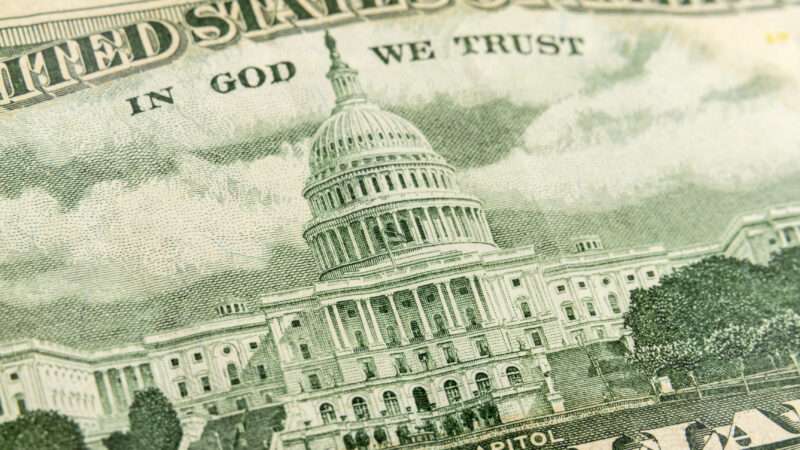
If the House of Representatives follows the Senate's lead and passes the Inflation Reduction Act, it would become the first major piece of legislation to have even a small positive impact on the federal budget deficit since President Barack Obama was in office.
But don't go popping those champagne corks just yet, deficit hawks.
The Inflation Reduction Act—which, notably, won't reduce inflation, but that's another story—cleared the Senate on Sunday with a 51–50 vote (Vice President Kamala Harris provided the tie-breaker). The bill includes an estimated $650 billion corporate tax hike and directs about $300 billion of that new revenue toward deficit reduction over the next decade, a key priority for Sen. Joe Manchin (D–W.Va.), who negotiated the package with Senate Majority Leader Chuck Schumer (D–N.Y.).
Within the context of the federal government's wildly out-of-whack budget, however, the promised savings from the Inflation Reduction Act are tiny at best—and that's only if those savings actually materialize, which they might not.
Start by comparing the bill's promised deficit-reduction efforts with how other recent efforts by Congress and the Biden administration have inflated the budget deficit.
When looking at the impact of legislation on the federal deficit, projections always take into account the next 10 years of federal spending and expected revenue—in other words, that $300 billion reduction created by the bill is the expected total amount over the next decade. That sounds like a lot of money—and it is!—but it looks a lot smaller when you stack it up against other bills Congress has passed in recent years. According to the Congressional Budget Office (CBO), the 10-year deficit has increased by about $2.4 trillion since President Joe Biden took office, thanks to items like the American Rescue Plan, the bipartisan infrastructure package, and this year's budget omnibus bill.
So, rather than looking at the Inflation Reduction Act as a $300 billion reduction of future budget deficits, it's probably more accurate to describe it as a plan to actually pay for about $300 billion of the estimated $2.4 trillion that Congress has agreed to borrow in the past 18 months.
In short, we'd still need seven more bills like the Inflation Reduction Act just to cover the rest of Biden's spending binge—and that's before we start trying to pay for the rest of the $6 trillion in borrowing that Congress did during the COVID-19 pandemic.
The actual math is likely to be even bleaker since a good bit of that $300 billion in deficit reduction is tenuous at best. Much of it won't arrive for several years, according to an analysis by the Committee for a Responsible Federal Budget. By then, it's likely that future run-of-the-mill spending increases or new initiatives like a student loan forgiveness program will have swamped whatever small relief results from this bill. If Congress decides to permanently extend the expanded Obamacare subsidies created during the pandemic, for example, it will end up costing about half of the supposed savings created by the Inflation Reduction Act.
If you want to see the really big picture, stack up the bill's supposed savings against the real drivers of the federal budget deficit in the next few decades: America's creaky entitlement programs. Social Security is set to run a $2.4 trillion deficit over the next decade years. Medicare will be $578 billion in the red over the same period.
Yes, $300 billion is a lot of money, but in the context of America's fiscal problems, it's actually not very much money at all.
"With or without this bill, deficits are going to be a trillion [dollars] per year," points out Chris Edwards, an economist at the libertarian Cato Institute. "Even under the best circumstances, this would reduce the deficit by $50 billion per year, starting five years from now, but we'd still be running trillion-dollar deficits from all the regular stuff the government does."
The bill's narrow Senate passage almost certainly doesn't foreshadow an oncoming rush of fiscal sanity in Washington. Instead, it's probably better understood as an indication of how a year-plus of runaway inflation has spooked lawmakers and slightly changed the political calculus around budgeting in Congress.
"We may soon look back on the 2009–2021 period as the era of 'free-lunch economics,' when hubristic politicians and economists declared that traditional fiscal and monetary trade-offs no longer existed in any meaningful form," wrote Brian Riedl, a senior fellow at the conservative Manhattan Institute and a former Senate budget committee staffer, in City Journal two months ago. With annual budget deficits well over $1 trillion for the foreseeable future and inflation spiking as a result of government stimulus, Riedl writes, "The 'free-lunch' experiment has collapsed."
In that sense, the passage of the Inflation Reduction Act probably matters more as a political signal than a fiscal one. Democrats read the polls, realized that Americans now say inflation is their top political concern, and rebranded their latest major piece of legislation as a response to that problem. It doesn't mean the incentives for higher spending and more borrowing are gone, but the political barriers to "free-lunch" fiscal policy have been raised ever so slightly.
On one hand, the Inflation Reduction Act signals a significant break with the recent, bipartisan trend of higher spending funded by more borrowing and higher deficits.
But in the context of America's $30 trillion national debt and the expectation of swelling budget deficits in the next few years, it is barely even a single step on the road to fiscal responsibility—and there's a long way to go.
The post The Inflation Reduction Act Won't Meaningfully Address the Budget Deficit appeared first on Reason.com.







